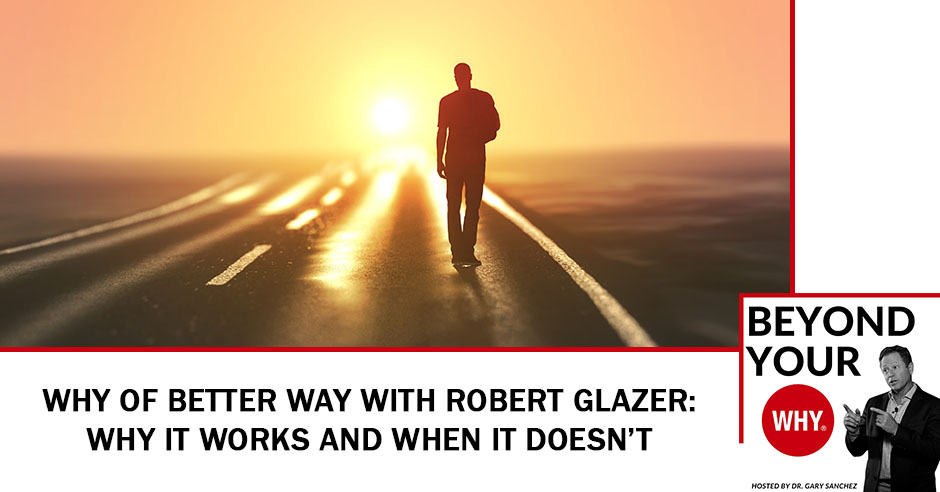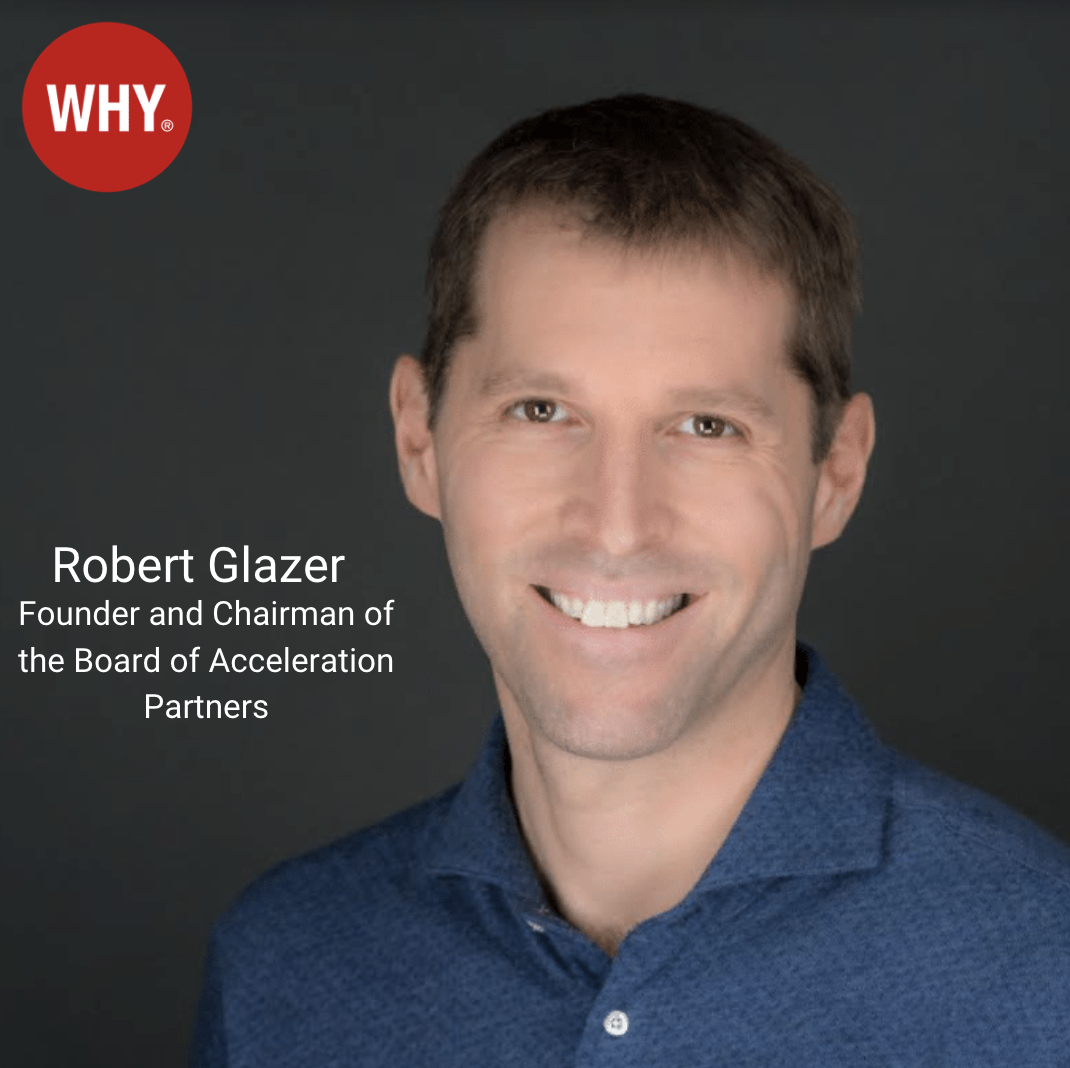
No one starts as a successful entrepreneur, and the journey to the top isn’t always smooth. Here to share his experience is Robert Glazer, the founder and Chairman of the Board of Acceleration Partners. Robert joins Dr. Gary Sanchez to share his career and business journey and how he grew his business by innovating the industry. Now, they are the largest agency globally in a specialized field called affiliate and partner marketing. The two also dissect Robert’s WHY of Better Way and how it paved the way for his success while also discussing when it works against his favor and how he mitigates it. Tune in for an interesting discussion and gain business insight and honest advice to help accelerate your journey.
—
Watch the episode here
Listen to the podcast here
WHY of Better Way with Robert Glazer: Why It Works and When It Doesn’t
We are going to be talking about the why of better way. If this is your why, then you are the ultimate innovator. You are constantly seeking better ways to do everything. You find yourself wanting to improve virtually anything by finding a way to make it better. You also desire to share your improvement with the world. You constantly ask yourself questions like, “What if we tried this differently? What if we did this another way? How can we make this better?”
You contribute to the world with better processes and systems while operating under the motto, “I’m often pleased but never satisfied.” You are excellent at associating, which means that you are adept at taking ideas or systems from one industry or discipline and applying them to another, always with the ultimate goal of improving something.
I have got a great guest for you. You are going to love this. His name is Robert Glazer. He is the Founder and Chairman of the Board of Acceleration Partners, a global partner marketing agency, and the recipient of numerous industry and company culture awards, including Glassdoor’s Employees’ Choice Awards two years in a row.
He is the author of the inspirational newsletter Friday Forward. He is the number one Wall Street Journal, USA Today, and international bestselling author of five books, Elevate, Friday Forward, How to Thrive in the Virtual Workplace, Moving to Outcomes, and Performance Partnerships. He is a sought-after speaker by companies and organizations around the world and is the host of The Elevate Podcast. Robert, welcome to the show.
Thanks, Gary.
I’m looking forward to this. This is going to be fun.
We are talking about the best why.
Let our audience get to know you a little bit. Where were you born? What were you like in high school? Take us back to that time frame.
I was born outside of Boston. I have a speech that I will give. When I gave that speech, I showed a lot of my report cards. My parents were moving out of the family house and brought them over. I went through them, and they were all on the scene. They were like, “He is capable but we can’t seem to motivate him.” I was very entrepreneurial in marketing or creative. None of that is typically rewarded in the normal education course. I was pretty bored and always told that I was underachieving. I know that has a direct impact on a lot of my why and other why.
It wasn’t until I’ve got to college that I’ve got through the standard core curriculum. I started realizing that I loved business and marketing. I liked learning. I was bored with everything that I was learning before. I was always tinkering with stuff. My mom would tell you. She would ask me to clean my room, and I would rearrange my entire room. I remember one time. I was 9 or 10 years old. I like playing electronics and thought, “I could take my battery-powered game. I could hook a plug up to it and run it.” That exploded in my hands when I did that.
Those were all the things outside the classroom. Those are maybe more now or maybe in a Montessori environment. Those were things more where it was like, “Color in the lines. Stop messing with that stuff and follow this stuff.” To this day, I ended up being diagnosed with ADD later on. I can’t pretend to be interested in something. It doesn’t work for me.
A student, B student or C student, what were you?
B student.
Off to college, did you have any idea what you wanted to do when you went to college?
I thought I wanted to be a lawyer because my dad was a lawyer. I liked the concept of it. I interned at a couple of law firms. I hated the experience and got exposed to the business. I was always running little business things. I remember I had this Now and Later. It was this candy that was super hot in our school. I was ten years old. I figured out how to take the train, buy and resell them for twice as much money. My grandmother found out about the operation. She was like, “You can shut it down or I will tell your mom.”
The things that I was doing that were entrepreneurial were negative in context. I realized that I loved business and marketing. My thinking outside of the box was like, “I’m not the guy you put in the box. I’m the guy you put to destroy the box.” It was interesting. I went abroad. I’ve got done with the core curriculum. I was getting Bs again. Once I started taking the classes I wanted, it didn’t matter how hard it was. I’ve got A’s in almost everything in my junior and senior years. My GPA was 3.0, and now that would be failing. Everyone is at 3.9. It was crazy for the first two years. It was at 3.9 in the second 2 years.
[bctt tweet=”I’m not the guy you put in the box. I’m the guy that you put to destroy the box.” username=”whyinstitute”]
What did you end up majoring in? Where did you go to college?
I went to Penn. Going abroad for me was a big transition point. I’m opening my mind and understanding that I love business and marketing. These are things that I can learn and get better at. This won’t be surprising to you. None of the majors I liked, so I applied to create my own major within the Individualized Major Department. It’s very on-brand. It was Business and Industrial Psychology. It allowed me to take the Business courses in Wharton with a lot of the Industrial Psychology people stuff. Running a professional organization now for over a decade has probably been the highest thing that I have used.
What was that moment when you realized it? I struggled with that myself. I went off to colleges in undeclared majors and kept that as long as I could. What was the moment that you knew, “Now, I know what I want to do?”
It was after I worked in a couple of those law firms. Honestly, I never like tests. I wasn’t good at the notion of having to study for the LSAT and more school. Also, I learn by experience. I learn more outside of the classroom. I thought about them like, “I don’t think I want to do that. I like this business, marketing, and people stuff.” That was the transition. I encourage everyone. We idolize some things like, “You should do them.” I worked in a law firm pretty terribly. One was okay. The other was terrible. I was like, “I don’t want to do this,” but it seemed fun from the outside.
I thought that was all negotiations and arguing with people. I was pretty good on my feet, and I didn’t even realize. My dad was a lawyer. He did Real Estate Law. He has never even seen a courtroom. Going abroad and being in another country, I was in Prague right after they were dealing with this restitution where they gave families back their businesses, and they didn’t know how to run them. We were doing some cool stuff like working with a brewery. I was like, “This stuff is fun. I love this.” You parachute into a situation. You don’t know what is going on. You’ve got to figure it out. That’s the stuff that makes people crazy but it’s the stuff that I like.
What was your first business? Did you start working for somebody?
I progressively worked for smaller and smaller firms until our firm was growing. The consulting firm I worked for abroad made me an offer, Arthur D Little. I went into strategy consulting for a couple of years. I worked at an incubator during the internet bubble and then a venture firm because I liked being around this company creation. I learned that early on. I liked these fast-growing companies. I was doing a lot of work for other people. I hadn’t figured out the angle I wanted to be around. Eventually, I worked for a startup. I came in outside the founding team.
I came in and made it better. I was like, “Why am I doing this for other people? I ended up finding myself in a very marginalized position helping founders make their businesses better.” I decided, “I would start a business and work with those businesses but I would own my business.” There are also bad cultures in a lot of these high-growth startups. I found a way to expose myself to that type of work but insulate myself from those cultures. That ended up being the better way culture aspect of it.
How do you feel about building something versus maintaining something?
I get bored in the maintenance mode. I’m not your maintenance person. I’m the guy who comes in. I even stepped down as the CEO of my own company because we were getting to a size. The way I explained it, I had a president who was my number two for almost a decade. When you are smaller, the R&D department is the company.
Now, the R&D department is a small piece. Keeping the trains on the track is a big piece, and that’s the CEO’s job now. I even realized, “I want to stay running the R&D department.” I moved into managing new products and services. I’m leading all of our M&A and the stuff that is new. As soon as it becomes monotonous, I’m not interested.
Tell us about your company.

Our company is Acceleration Partners. We are the largest agency globally in a specialized field called affiliate and partner marketing. We help some of the biggest brands in the world to build digital marketing programs that are made out of partnerships rather than buying clicks and impressions.
What got you into that? That’s a different angle that people don’t typically talk about. You don’t even hear about it that much unless you happen to be in that world.
It’s a win-win industry. It’s marketing. It’s a partnership, which I was drawn to. I fell into it a little bit by accident because I helped a company build its program that was incredibly successful. It grew to $300 million and sold. People went to all the other companies and called and said, “Can you come to help us do that?” I haven’t met anyone who started an agency intentionally yet. They solve a problem. They hire some people. When people ask them to do more, they hire some more, and then soon they are running an agency.
I do remember being at a conference in our industry and reading this. It was my epiphany moment. As I think about it, it’s a better way. There was a catalog of all these ads of people that could help you with your affiliate programs in it. They were the worst ads that I have ever seen. It looked like they were drawn in crayons. I was like, “If these are the people that are hiring to do marketing for them and their marketing is so terrible, we should be able to crush this.” That was my go-for-it moment because I was horrified at the quality of marketing from people who were being hired to do marketing.
It’s interesting the way you said that because that’s something I say all the time. I’m like, “If that person over there can do it like that, I can do it way better than that.”
In fact, what frustrates me the most is we were talking about a situation like this in the management team. When there’s a company in the right place at the right time, and they seem to do everything wrong, they are still doing well because something endemic to me wants to believe that you have to do it well and good to do well. We try to do everything well and improve. It’s harder to be an agency than it is to be a hot software company sometimes.
People come to you when they want to expand their reach using partnerships versus going out and buying a ton of media.
We use software to build partner programs so that you can have 1,000 partners talking about promoting your product digitally and putting in things. The difference is they get paid only on a performance basis. In some ways, it’s a better way to do marketing. Rather than paying for a click or an impression, you are paying for an outcome or a sale.
If I said to you, Gary, like, “You are trying to get good guests for your podcast. I have the best guest podcast site in the world. I will promote people and send them to you. As you accept them, will you pay me $100 per lead?” You go, “That’s great. That’s much better than the PR service I’m using because I pay them upfront, and I have no idea what I will get.”
If you are a business owner and you have spent any kind of money marketing, it’s an amazingly frustrating experience. You have no idea what you are going to get for the amount of money.
You hear all your friends who have built their business on social media, digital marketing or paid search. If you think there’s inflation in gas and your housing, the inflation in digital marketing and the prices has gotten to the point where it’s very hard to make money unless you are a large player with sophisticated tools.
It’s a massive auction, and the whole world is buying. Auctions don’t tend to benefit the buyers. They tend to benefit the sellers. I always say a little bit about what we do. It’s SEO versus paid search. You need to do the work, put it in, and build a moat. You reap longer-term rewards. It’s not as instantly gratifying but because of that, it tends to be much more sustainable.
[bctt tweet=”It’s really hard to build a competitive, sustainable advantage.” username=”whyinstitute”]
How were you able to build all these partnerships? You are starting your company fresh. Maybe you already had some connections, and then you put them together and said, “How about if I connect you with someone?”
There’s a known group of people in the industry. They are called professional affiliates. There are people who are known to do this. Part of our thing is building that Rolodex and how to figure out someone who we worked with the one-part program and why they would be good for another program that’s not competitive. There’s a known group of people in this place. We are like matchmakers. There are people looking to date on both sides. Half the group has content, and half the group has the stuff to sell. We are bringing them together.
Are you always adding new partners and products? How does that work?
I’m always adding new clients and partners. Growing our partner Rolodex is a key asset for our business.
To me, from another better-way guy, that sounds like so much fun. It’s connecting people, connecting things, and finding a better, “This would be better if you did it this way.”
The model is like, “Who has figured out Snapchat? Who has figured out mobile marketing? Who has figured out TikTok marketing? How do we go get them and bring them into partnership with a retail brand?” The essence is like sales. We’ve got to find who is new, interesting, and doing something fun.
You have also written five books.
I wrote it all over five years because I’m not good at not doing stuff.
What was the first book? Take us through the sequence of your books.
I had this note that I sent to my team called Friday Forward, that I started years ago. That ended up going outside of our company, reaching a couple of hundred thousand people across the world every week. This is an inspirational and thought-provoking note. I decided to turn that into a book or compilation of the 52 best Friday Forwards. I pitched that to a bunch of places, and they said, “We love your writing but no one buys compilations.” I ran into one agent who said, “I love your writing. These are amazing. No one buys compilations but you have a book here. What is the story of these stories?”
I went back and deconstructed, “What is the framework of this into this thing called? It’s capacity.” I spent a couple of years reworking that into, “Why did Friday Forward work? What had changed my life? What was the whole thing?” I came up with this framework of capacity building. That was the basis of my second book, Elevate, which has still been the most popular. The first book I wrote was called Performance Partnerships to try to explain to the world why our industry was a better way effectively and convince people they misunderstood affiliate marketing and what it could be. That was real like, “We are going to try to turn the industry our way.”
That book has become a default training book in organizations. It was the first book written on the industry, and then there was Elevate. After Elevate, it was a huge success. I ended up going back in writing and publishing that Friday Forward book. Once I had an audience, I held on to it. We were an all-remote firm for over a decade, and COVID hit. We had been doing this for a while, and people started asking us all kinds of questions. I was giving speeches. Every time I give the speech, I would take the questions they ask and tweak them.

I have always said like, “My purpose is to share ideas that help people and organizations grow.” I also hate the monotony, as we talked about. I was like, “Why don’t I turn this into a book so I can stop giving the same presentation over and over again and I can answer all the things?” With my publisher, 90 days later, we’ve got it down to an eBook. I doubled and released it as a full book six months later. That was the number-one New York Times, USA Today, and WSJ bestseller.
Which one was that?
That was How to Thrive in the Virtual Workplace.
You had one after that even.
That’s called Moving to Outcomes. That’s my second marketing book. It’s the sequel to Performance Partnerships five years later.
Tell us about Moving to Outcomes.
The first book was meant to explain the affiliate opportunity in the industry and what companies were missing. This is a little more of the shift that I was talking about. It’s about why people are holistically moving to partnerships and why the marketing is moving to direct marketing if you are not a brand. If you are spending marketing directly when you want to do it on an outcome basis, it’s not a click or impression basis. It’s all these reasons in digital marketing that companies need to think about what is next once the Facebook-Amazon gravy train runs its course a little more.
From where it was a few years ago to now, it’s a different animal.
It’s hard to build a competitive and sustainable advantage. You can spend a lot of money. You can get started but it’s hard, particularly as a little guy, to fight a war. You are fighting with BB guns while people have cannons, airplanes, and things that they can do to get better yield. If you think about a stock portfolio, I’m not going to get rich on Tesla, Apple, and Microsoft over the next decade. They are so big that they are not going to 10X. I need to find what is the next company. For a lot of these channels, they have reached the maturity where they are a bond now. They don’t sell your bonds but you are not going to get your huge growth off of your bond.
In this mastermind that I’m in, one of the guys spends the most money of anybody in the world on YouTube ads. It’s fascinating how often stuff changes for him, and he gets shut down.
I’m sure he could tell you it has gotten twice as expensive to buy the same thing.
Within your company, you have utilized the why with your team.
[bctt tweet=”Every strength at 105 or 110 degrees is a weakness.” username=”whyinstitute”]
I was exposed to this. It’s your framework through a facilitator. It was life-changing for me. I remember he was walking through the example at a conference. Jamie and I had very similar origin stories around this. It’s around how he is coaching a husband and a wife. They were going on their anniversary. She had planned every day of the trip out, and then he tried to figure out how to make every day better. It turns out I’m better way in my wife’s right way. We are the most combustible of the why from a marriage side.
It was game-changing for me and my business. I’m looking at it also for my wife, the family and me. We use the language. She will say like, “We are going to the thing tonight. Please don’t try to make this better.” When she and my son, who are both right-way and can’t pick to see if their life is pizza versus Chinese food on a Friday night, they go back to the store and come back with everything because they can’t decide or nothing. I will be like, “Make a decision. There’s no wrong choice here.”
It’s one of the things I have seen that’s interesting. I have a lot of right-way personalities in my life in the company. While that is potentially very combustible, the problem is they are the people you want to pull the plug to make a great decision but they can’t dumb down that decision-making apparatus to simple decisions. They are paralyzed by pizza or Chinese food but they would be the first person to know whether you should pull the plug or not pull the plug in a life-threatening situation.
That’s interesting what you are saying there because what I found in working with lots of companies is the missing piece for most of them is not having somebody with the right way on their team.
They frustrate the heck out of you but they will slow you down. Our team has a lot of makes-sense people, too. When you throw a big harebrained idea on them and don’t understand what it is, they get so frustrated. I know that we have something good when I’m able to make it clear enough where they are like, “That makes sense. We should do that.” In our leadership team, we joke about these archetypes. We see them all the time. They are the most powerful thing that I have seen in interpersonal communication.
I told you a guy on our team for years. His visceral reaction was like, “I don’t buy this whole thing because you can’t put in the archetype.” Everything he says, “Is it right or not fundamentally?” We have worn him down at this point. He admits it. Even admitting it for right people that you can put people in the archetypes for them, sometimes they don’t think that’s right.
Do you have anybody on your team with the why of challenge?
It’s not on my leadership team. They don’t tend to survive in the company for more than a couple of years. We had one. We are still friends with him. We talked about it. He would throw a grenade into things every six months. We have talked about this openly. It was funny. They can’t help themselves. We have another person now who is challenged. He is challenged and great. He was the one in the session who was like, “This whole thing is BS in this why thing.”
I found that to challenge people. A lot of them almost have to end up working for themselves because they will throw a grenade into a situation if they are hired on that thing. We have another one in sales. He is phenomenal but he does not like to follow the playbook or do what he is told. We learned like, “Telling me can’t do something. There’s no way you could sell in Eastern Europe.” He gets all over it. He works for the right way person. They have to figure that out a little bit.
It was interesting because you were speaking my language. You were saying the things that I say. You have noticed the things that not a lot of people notice but you did notice them. You articulated them in a way that I completely get. It’s neat to have somebody with your why to have a conversation with because you are speaking the same language.
The most powerful thing and why we teach this to our emerging leaders on the core values is interpersonal. More than any other tests, StrengthsFinder and Kolbe, this gets to the root tension between people and their understanding of that. My understanding of what a makes-sense needs, what a right way needs or what people need is the ultimate team thing.
We don’t use the language that someone is like, “That was a very deep thing to say.” What is fascinating with the makes-sense people is they say it all the time. They end sentences with, “That makes sense.” You hear it everywhere. I can tell you where people are going to struggle or do well interpersonally based on what their why is and where there are going to be natural conflicts.
You also hit on something a little bit ago that is what I have been saying about myself and about other people with the why of better way. We don’t necessarily make a good long-term CEO. We’ve got to get somebody else to replace us. We can build. This is what I have found, and maybe this will be even helpful for you. The best why that I know of for the CEO after it has been built is the why of contribute because they are now about everybody else and making everybody else better.

You were about, “How am I going to get this sucker to where I needed to be? Who do I get to put in place to make that happen?” If you can put somebody with the why of contribute in the CEO position, then it’s going to be phenomenal for them. They are going to love you. Your team is going to love it. Everybody is going to love it. I don’t know what the why is of the person.
He is a makes-sense. We are all very high. He probably contributes as our whats or hows. In our team, there’s a high level of contribution, trying to make people better and improve them. That’s endemic in our culture. I will tell you one of the things is self-prospection. I’m sure that I have had to learn as a better way is that every strength at 105 or 110 degrees is a weakness. I tend to exhaust myself, my team, and my family.
One of the things I have coached people on in their whys or other whys is, “If I want to improve everything in the company, I can frustrate people to the point where nothing gets improved.” I have had to learn to pick my spots of, “I’m going to make this thing better. I can’t make everything better or nothing will get better.” I do it to myself, and I know I exhaust my wife with it. At times, I’m doing family with it. It’s being aware of that. That, to me, is the biggest exhaustion.
Even we bought an investment place for a living, I’m constantly ordering extra batteries from Amazon, so we have them. I’m moving that picture on the wall, and people are like, “How come you can’t sit down and enjoy the play?” I’m like, “I don’t know. I was still stuffed this week.” I go on vacation, and I’m working half the time. It’s not work. It’s on moving stuff around or hanging this picture. It’s an optimization, both a blessing and a disease.
Here is an interesting question. Are you ever satisfied?
It’s probably not, which is a good thing and a bad thing. It’s a hard time being present. I have always done these renovation projects. Once I had a new one, I never thought about the old one again. When looking at it, it’s almost like I need a new thing to turn my sights on to close off the old one. That’s the way I mentally detach myself. It’s not necessarily a healthy thing but it is what it is at this point.
Are you able to celebrate wins?
Our whole team is not good at that. We joke, “We are all Gen X leadership team by parents that were not effusive in praise like parents are now.” The pro side of that is we get over difficulties quickly. We don’t linger on it but we are not great at celebrating the upside. That is both my personality and very endemic. We talked about all the childhood upbringing of Gen X versus Gen Y and Z.
I wonder if that’s what it is because I feel the same way. Luckily, I have people on my team that point things out to me. Otherwise, I would be like, “We did this. Now, what is next?”
That is criticism, and we hear that. It’s both our team but also cultures that are changing. You are talking about generations that have grown up with an extreme amount of praise for, in some cases, mediocre effort. We have to be aware of that. It’s tough. We talk about it. We are a high-performance culture. People generally need more of that open praise but we also want to be careful. We probably shouldn’t hire people that want praise for mediocre effort because that doesn’t align with our culture like, “You tried hard.”
I went to my kid’s invention convention. I loved that when I was a kid, not surprisingly. Everyone got an honorable mention. People had theoretical projects that their parents did. I was like, “This is ridiculous. What the heck is this teaching?” I remember the guy who won my year. He figured out how to straw up his bike, and you could drink out of it. He won a prize. Now, everyone gets an honorable mention. Clearly, either the parents did the projects themselves, or it was a theoretical thing like, “This is a food shrinker, and I point a gun at it.” I’m like, “I don’t understand. This is supposed to be kids doing the work.”
What is next for you, Robert? Where are you headed next?
[bctt tweet=”You can’t make everything better or nothing will get better.” username=”whyinstitute”]
What we are talking about is I’m trying to self-identify and solve a problem. I have been 70/30 for a few years. I have been the CEO of the company. Also, I have a great team. I have been writing books and doing stuff outside the company. The issue is it has been 130% and not 70/30. I physically and mentally exhausted myself. It’s capped off by the global pandemic and doing a big deal with a private equity partner.
I realized I wanted to get down to 70/30. I will turn over the CEO role. I will continue doing the stuff that I love. I will continue writing the books but I’m not going to do it on the weekends. I’m not going to do it at night. I have got some golden years with my kids. Part of the restructure was to give me some space to think and be in the R&D department but also to practice being more present.
Initially, after the transition with new partners in the role, I tried to throw myself into new things, and then I realized like, “I can’t do this. I need to step back and recover physically and mentally from a ten-year marathon of never stopping.” A lot of that was some awareness of what I was likely to do. I’m not letting myself get into fundamentally any major new thing for a while. I’m very invested in my business. I’m continuing a different role but I’m not looking to start anything new or do anything majorly now.
I’m interested to see how that goes because that’s me as well 100%, “Let’s go.” I have not figured out or been able to not do that. I feel like I’m wasting time if I do that.
A twelve-hour day, I have nothing. I’m not bored at all. I’m learning how to do M&A for our business. I have joined some boards. I’m filling in with macro-things. I have recognized I have run myself a little too hard. I’m trying to do all of these things. I’m trying to run a company, write books and speak all this stuff. Dialing it down, it has been healthy.
I don’t think it’s a long-term solution but in some ways, it’s a little meta. I don’t want a second act now. My kids are all in high school and going to college. I want these years. If I don’t give myself some space, I will not figure out some cool things that I could do in 5 or 10 years. I need the space to figure out what that is for a few years but I’m not in any rush to do it now.
I’m going to be very interested in watching you.
You either learn something. You will say, “I told you that’s not going to work.”
It’s how we are wired.
Have you ever exhausted yourself?
For sure. I have exhausted people around me. It will be fun to watch. The last question for you, what is the best piece of advice you have ever been given or the best piece of advice you have ever given?
It’s a little bit of both. I would say this under the context of all the people shifting careers and thinking about something new otherwise. There are good and bad reasons to do that. I see a lot of people in their twenties chasing $500, $1,000 or $5,000 more irrespective of what that situation is or otherwise. The most important thing you can do early in your career is work for extraordinary leaders and go to companies with extraordinary training programs. Focus on learning. You are always underpaid in your twenties.

The difference to me of people who worked for great leaders, got great training, and focused on making themselves the best they could get, that $5,000 or $10,000 more that the other job offered you is irrelevant. When you turn 30, you start to be an expert in something. I would focus on the environments where you have the most learning and work for incredible leaders. Frankly, learn on someone else’s dime. Everyone is so eager in their twenties to get somewhere and get to the end. I was always underpaid in my twenties, no matter how good of the work that I was doing.
You are setting yourself up for what comes next by working for the right companies and the right leaders and being in an incredible training program. You probably know the amount of sales leaders I know who worked at Cutco. As a simple example, some of the best salespeople in the world went through this Cutco training when they were twenty. That’s what you want to do. That’s the best training and preparation that you could have.
I would add to that because there’s a common theme for many of the people I have had on the show who have done amazing things. When I pointed back to, “What was that turning moment,” a lot of them would say, “It’s when I’ve got into personal growth.”
For me, I joined a lot of people. It could be any of these organizations, whether EO or YPO. When I joined EO, I jumped into this exponential learning. It was like drugs. It was incredible. The only thing I would caution that I found myself going down this road is if you are married or in a partnership, be very careful going down that road without bringing your partner along with you.
That is why groups like EO and YPO have these spousal and partner things around trying to create that same experience. Sometimes you go to these conferences. You are going to this learning like, “In this why thing, my wife was with me there in Buenos Aires, Argentina.” These are the things that either happen together or they happen apart. I have seen it do amazing things for relationships and pull relationships apart.
If there are people that want to connect with you, follow you, see what you are up to, and maybe want to work with Acceleration Partners, what would be the best way for them to connect with you?
They can learn about Acceleration Partners. It’s easier to google it than to spell it, so just google Acceleration Partners. We are doing our job. We should come up with number one. In terms of me, I have everything under one place now, RobertGlazer.com. You can sign up for that free Friday Forward note. The books are listed there. I have got a course on helping to discover your personal core values, which goes well with the why stuff, and I have seen a lot of overlap. Speaking and other stuff is all on that page.
Thank you so much for being here. I was looking forward to this because we have got a lot of people in common that we know, and you have utilized the why so much. I’m going to follow you now because I want to see what happens with this little test you are doing.
You are checking the little wedding clock.
Thanks so much for being here.
Important links
- Acceleration Partners
- Friday Forward – Newsletter
- Elevate
- Friday Forward
- How to Thrive in the Virtual Workplace
- Moving to Outcomes
- Performance Partnerships
- Sought-After Speaker – Robert Glazer
- The Elevate Podcast
- Why of contribute
- RobertGlazer.com
- RGlazer@AccelerationPartners.com
About Robert Glazer
 Robert Glazer is the Founder and Chairman of the Board of Acceleration Partners, a global partner marketing agency and the recipient of numerous industry and company culture awards, including Glassdoor’s Employees’ Choice Awards two years in a row.
Robert Glazer is the Founder and Chairman of the Board of Acceleration Partners, a global partner marketing agency and the recipient of numerous industry and company culture awards, including Glassdoor’s Employees’ Choice Awards two years in a row.
He is the author of the inspirational newsletter Friday Forward, and the #1 Wall Street Journal, USA Today and international bestselling author of five books: Elevate, Friday Forward, How To Thrive In The Virtual Workplace, Moving To Outcomes and Performance Partnerships. He is a sought-after speaker by companies and organizations around the world and is the host of The Elevate Podcast.

